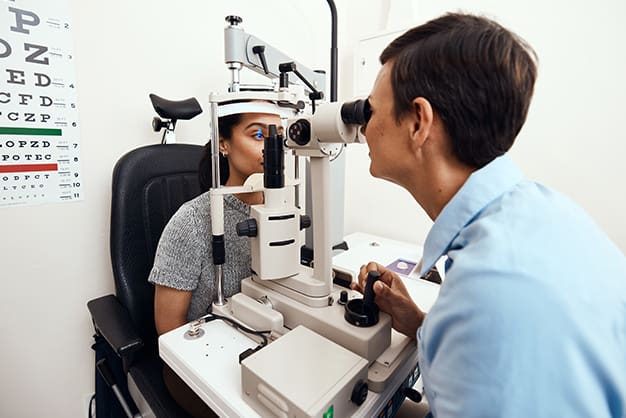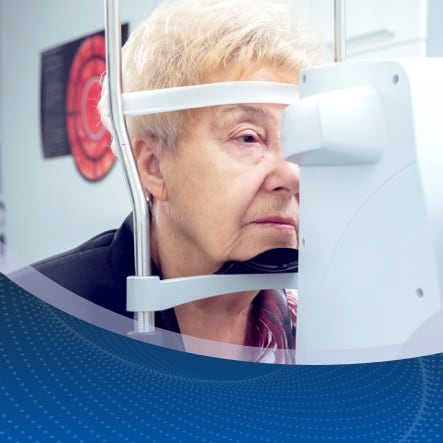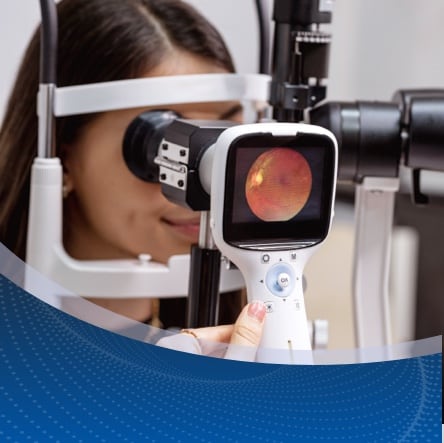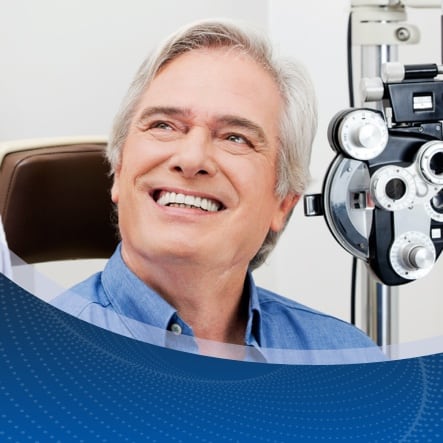Yes, Medicare does cover certain eye exams, but not all. Routine yearly vision exams for updating glasses or contacts are not covered under Original Medicare (Part A & B). However, Medicare Part B will pay for eye exams that are medically necessary, such as:
- Glaucoma screenings (for high-risk patients)
- Diabetic eye exams
- Cataract-related exams and follow-up testing
- Macular degeneration testing and treatment
For routine vision exams, Medicare Advantage (Part C) plans are usually the best choice since they often include annual eye exams and vision benefits.
Taking care of your vision is essential for your overall health and safety. As we age, eyesight changes are common, and regular checkups can make all the difference. But knowing exactly what Medicare covers (and what it doesn’t) helps you avoid unexpected bills and plan better for your vision needs.
This blog will concisely summarize what is and isn’t covered under Medicare.
Table of Contents
Medicare & Eye Exam Coverage
Does Medicare B pay for eye exams? How about Medicare A?
Medicare can be confusing when it comes to vision care. So, what exactly is covered when you need an eye exam?
- Original Medicare (Part A & Part B) – Unfortunately, routine eye exams for glasses or contact prescriptions are not covered. Medicare Part B will not pay for a yearly vision check just to update your glasses.
- However, Medicare does cover certain eye exams when they’re medically necessary. For example, Part B covers annual eye screenings for diabetics (to check for diabetic retinopathy) and glaucoma tests for high-risk patients. It also covers exams related to cataract surgery (like measurements for an intraocular lens and one post-surgery refraction).
Does Medicare Advantage (Part C) Cover Eye Exams?
Medicare Advantage plans (Part C), which are offered by private insurers, often include extra benefits that Original Medicare lacks. Many Part C plans provide coverage for:
- Routine vision exams – Yearly eye check-ups, even if you don’t have a diagnosed eye condition.
- Corrective lenses – Coverage or discounts for prescription eyeglasses and contact lenses.
- Vision correction procedures – Some plans offer partial coverage for services like LASIK or other eye surgeries not covered by Original Medicare.
Tip: If routine vision care is important to you, compare Medicare Advantage plans to find one that includes eye exams and eyewear benefits.
Does Medicare Cover Yearly Eye Exams?
Original Medicare does not cover yearly eye exams for glasses or contact prescriptions. The only yearly exams Medicare covers are for specific medical conditions:
- Diabetes → One exam per year for diabetic retinopathy
- Glaucoma risk → One glaucoma screening per year for high-risk individuals
If you want coverage for routine yearly vision checkups, a Medicare Advantage plan may be your best option.
How Often Does Medicare Pay for an Eye Exam?
Medicare Part B typically pays for an eye exam once every 12 months if:
- You are diabetic (for diabetic retinopathy screenings), or
- You are at high risk for glaucoma
It also covers eye exams related to cataract surgery and macular degeneration as needed.
If you’re looking for a routine eye exam once a year to update your glasses, Original Medicare will not cover it but many Medicare Advantage plans will.
Does Medicare Cover Vision?
Medicare covers medical eye care but not routine vision care. That means:
Covered under Part B:
- Cataract surgery and related exams
- Glaucoma screenings (if high risk)
- Diabetic eye exams
- Macular degeneration tests/treatments
Not covered under Original Medicare:
- Routine vision exams
- Glasses and contacts (unless tied to cataract surgery)
Medicare Advantage plans often fill this gap by offering benefits for routine exams, eyewear, and sometimes even procedures like LASIK.
Coverage for Specific Eye Conditions
Medicare Part B covers certain eye conditions, perfect for individuals at risk or with specific diseases.
Diabetic Eye Exams
Medicare Part B helps cover a yearly diabetic eye exam for individuals diagnosed with diabetes, including those with diabetic retinopathy. To qualify for coverage, the exam must be performed by an eye doctor who is legally allowed to conduct the test in your state. After meeting the Part B deductible, you are responsible for 20% of the Medicare-approved amount for these exams. A copayment may also apply if the exam occurs in an outpatient hospital.
Glaucoma Testing
For those at high risk of developing glaucoma, Medicare Part B covers a glaucoma test once every 12 months.To be classified as high-risk, you must meet at least one of the following criteria:
- Have diabetes
- Have a family history of glaucoma
- Be African American and 50 years old or older
- Be Hispanic and 65 years old or older
Like diabetic eye exams, after satisfying the Part B deductible, you will pay 20% of the Medicare-approved amount, with additional copayments for hospital outpatient settings.
Macular Degeneration Testing
Medicare Part B may help cover certain tests and treatments for age-related macular degeneration (AMD). If you have AMD, you may receive coverage for applicable tests following the same payment structure—20% of the Medicare-approved amount after meeting the deductible and potential copayments for services rendered in outpatient hospital settings.
Coverage for Cataract Surgery
Does Medicare cover cataract surgery? Yes, as long as you follow the appropriate steps.
Medicare Part B not only helps with the cost of corrective lenses following cataract surgery but also covers the surgery itself. If you need cataract removal, Medicare can assist with your expenses, provided you have a documented diagnosis and the surgery is considered medically necessary. Once you meet your Part B deductible, you’ll usually pay 20% of the Medicare-approved cost for the surgery, plus any additional copayments for outpatient services.
Glasses and Contact Lenses
Medicare typically does not cover the cost of eyeglasses or contact lenses. However, as mentioned above, if an individual undergoes cataract surgery and has an intraocular lens implanted, Medicare will assist with the cost of one pair of corrective lenses, subject to the Part B deductible.
Medicare Advantage Plans
Some Medicare Advantage plans may offer additional vision coverage, including routine eye exams and prescription eyewear. Beneficiaries must review their specific plan details as coverage can vary widely. Many plans may include comprehensive vision care options, which are best for regular eye care.
FAQs: Medicare and Vision Care
Does Medicare Cover Eye Exams for Glasses?
No, Original Medicare does not cover routine vision exams for updating your glasses or contacts. However, Medicare will cover one set of glasses or contacts after cataract surgery.
How Much Do Eye Exams Cost Without Insurance?
Without insurance backing, the cost of an eye exam can vary. On average, you might expect to pay a couple of hundred dollars for a comprehensive eye exam. However, prices can fluctuate depending on various factors, including the type of provider you choose, location, and whether additional testing or services are required.
Does Medicare Cover Glaucoma Screenings?
Yes, Medicare Part B covers annual glaucoma tests for high-risk individuals.
How Can I Check If My Eye Exam is Covered?
The quickest way is to visit Medicare.gov and look up vision coverage to confirm.
How to Save on Vision Care
Even with Medicare coverage, out-of-pocket expenses for vision services can accumulate. Beneficiaries are advised to consult official Medicare resources or speak with a licensed insurance agent for more detailed information on what Medicare covers regarding eye care.
Griffey Eye Care & Laser Center accepts most insurance plans, and if your plan requires a referral, we can assist with that process. We accommodate various payment methods, including cash, checks, major credit cards, and flexible financing options through Alphaeon and CareCredit. Contact an eye doctor in Chesapeake, VA, at 1-888-873-9348 for help or to book your appointment through our website.
**Please note that the suggestions provided in this blog are for general informational purposes only and may not be suitable for your specific insurance plan and insurance needs. It is important to consult a qualified healthcare professional for personalized advice and treatment.**












